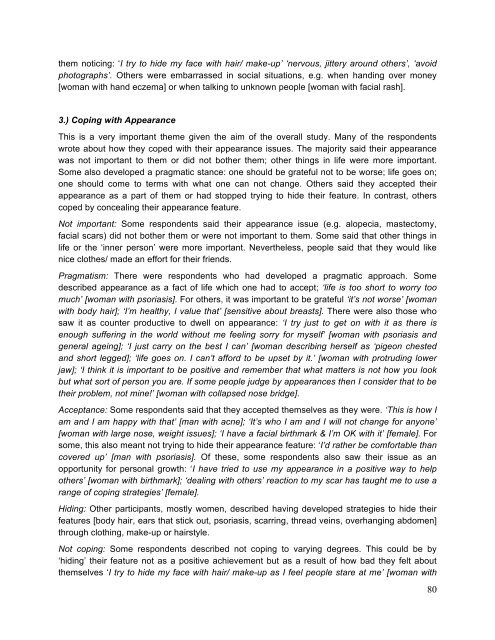Download the report - The Healing Foundation
Download the report - The Healing Foundation
Download the report - The Healing Foundation
Create successful ePaper yourself
Turn your PDF publications into a flip-book with our unique Google optimized e-Paper software.
<strong>the</strong>m noticing: ‘I try to hide my face with hair/ make-up’ ‘nervous, jittery around o<strong>the</strong>rs’, ‘avoid<br />
photographs’. O<strong>the</strong>rs were embarrassed in social situations, e.g. when handing over money<br />
[woman with hand eczema] or when talking to unknown people [woman with facial rash].<br />
3.) Coping with Appearance<br />
This is a very important <strong>the</strong>me given <strong>the</strong> aim of <strong>the</strong> overall study. Many of <strong>the</strong> respondents<br />
wrote about how <strong>the</strong>y coped with <strong>the</strong>ir appearance issues. <strong>The</strong> majority said <strong>the</strong>ir appearance<br />
was not important to <strong>the</strong>m or did not bo<strong>the</strong>r <strong>the</strong>m; o<strong>the</strong>r things in life were more important.<br />
Some also developed a pragmatic stance: one should be grateful not to be worse; life goes on;<br />
one should come to terms with what one can not change. O<strong>the</strong>rs said <strong>the</strong>y accepted <strong>the</strong>ir<br />
appearance as a part of <strong>the</strong>m or had stopped trying to hide <strong>the</strong>ir feature. In contrast, o<strong>the</strong>rs<br />
coped by concealing <strong>the</strong>ir appearance feature.<br />
Not important: Some respondents said <strong>the</strong>ir appearance issue (e.g. alopecia, mastectomy,<br />
facial scars) did not bo<strong>the</strong>r <strong>the</strong>m or were not important to <strong>the</strong>m. Some said that o<strong>the</strong>r things in<br />
life or <strong>the</strong> ‘inner person’ were more important. Never<strong>the</strong>less, people said that <strong>the</strong>y would like<br />
nice clo<strong>the</strong>s/ made an effort for <strong>the</strong>ir friends.<br />
Pragmatism: <strong>The</strong>re were respondents who had developed a pragmatic approach. Some<br />
described appearance as a fact of life which one had to accept; ‘life is too short to worry too<br />
much’ [woman with psoriasis]. For o<strong>the</strong>rs, it was important to be grateful ‘it’s not worse’ [woman<br />
with body hair]; ‘I’m healthy, I value that’ [sensitive about breasts]. <strong>The</strong>re were also those who<br />
saw it as counter productive to dwell on appearance: ‘I try just to get on with it as <strong>the</strong>re is<br />
enough suffering in <strong>the</strong> world without me feeling sorry for myself’ [woman with psoriasis and<br />
general ageing]; ‘I just carry on <strong>the</strong> best I can’ [woman describing herself as ‘pigeon chested<br />
and short legged]; ‘life goes on. I can’t afford to be upset by it.’ [woman with protruding lower<br />
jaw]; ‘I think it is important to be positive and remember that what matters is not how you look<br />
but what sort of person you are. If some people judge by appearances <strong>the</strong>n I consider that to be<br />
<strong>the</strong>ir problem, not mine!’ [woman with collapsed nose bridge].<br />
Acceptance: Some respondents said that <strong>the</strong>y accepted <strong>the</strong>mselves as <strong>the</strong>y were. ‘This is how I<br />
am and I am happy with that’ [man with acne]; ‘It’s who I am and I will not change for anyone’<br />
[woman with large nose, weight issues]; ‘I have a facial birthmark & I’m OK with it’ [female]. For<br />
some, this also meant not trying to hide <strong>the</strong>ir appearance feature: ‘I’d ra<strong>the</strong>r be comfortable than<br />
covered up’ [man with psoriasis]. Of <strong>the</strong>se, some respondents also saw <strong>the</strong>ir issue as an<br />
opportunity for personal growth: ‘I have tried to use my appearance in a positive way to help<br />
o<strong>the</strong>rs’ [woman with birthmark]; ‘dealing with o<strong>the</strong>rs’ reaction to my scar has taught me to use a<br />
range of coping strategies’ [female].<br />
Hiding: O<strong>the</strong>r participants, mostly women, described having developed strategies to hide <strong>the</strong>ir<br />
features [body hair, ears that stick out, psoriasis, scarring, thread veins, overhanging abdomen]<br />
through clothing, make-up or hairstyle.<br />
Not coping: Some respondents described not coping to varying degrees. This could be by<br />
‘hiding’ <strong>the</strong>ir feature not as a positive achievement but as a result of how bad <strong>the</strong>y felt about<br />
<strong>the</strong>mselves ‘I try to hide my face with hair/ make-up as I feel people stare at me’ [woman with<br />
80


